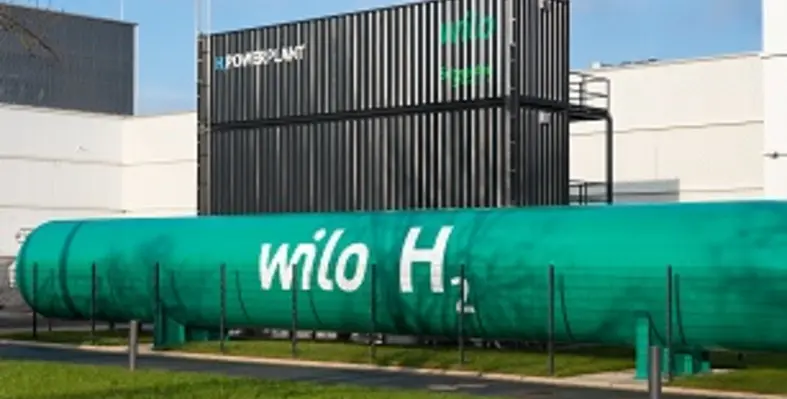Wilo Powers has brought the first ever green hydrogen solution of its kind to the market to prove the concept of power independence and generation in a decentralised way
Already in operation at the company’s HQ in Germany, the H2Powerplant has been proven in its operation and will now be rolled out at all Wilo locations. It is also available to the market in a modular arrangement for varying power demands and in four different sizes that will be able to generate power.
The system uses electrolysis to convert renewable energy generated from solar, wind and hydropower into green hydrogen. When it’s needed, a fuel cell can then be used to convert the hydrogen back into electrical energy and the waste heat is either used in the interconnected system for heating, stored or converted into cooling on site.
This system can also be used to support new and/or existing combined heat and power (CHP) systems that have been designed to work with a blended hydrogen mix, meaning it also has the potential for retrofit applications.
Dave Williamson, sales and marketing director at Wilo UK, commented, “Green hydrogen is fundamental for achieving the climate protection goals agreed in Paris. Ultimately, this game-changing technology will enable companies to accelerate the migration to clean energy from existing infrastructure without having to start from scratch.
“For example, companies using gas or CHP systems that will operate with a blended gas mix that can utilise hydrogen from the H2Powerplant and reduce carbon emissions within existing infrastructure. Wilo has already received enquiries from world-leading large energy users in the UK, wanting to implement the H2Powerplant as part of their own net zero strategies and when bidding for major sustainability-driven tenders.”
The first pilot project for H2Powerplant was approved in May 2022. It saw Wilo and industry partners design and build the first functioning system at Wilopark in Dortmund, Germany. Initially the intention was to use the plant as an emergency power supply, but as the project evolved, greater power potential was realised within the solution. It went on to power much more across the site, including lighting, the EV charging system and part of the heating.
Construction took place from July 2022 and the system was commissioned and inaugurated on 9 September 2022.












